Charles E W Bean, Diaries, AWM38 3DRL 606/256/1 - 1915 - 1936 - Part 18
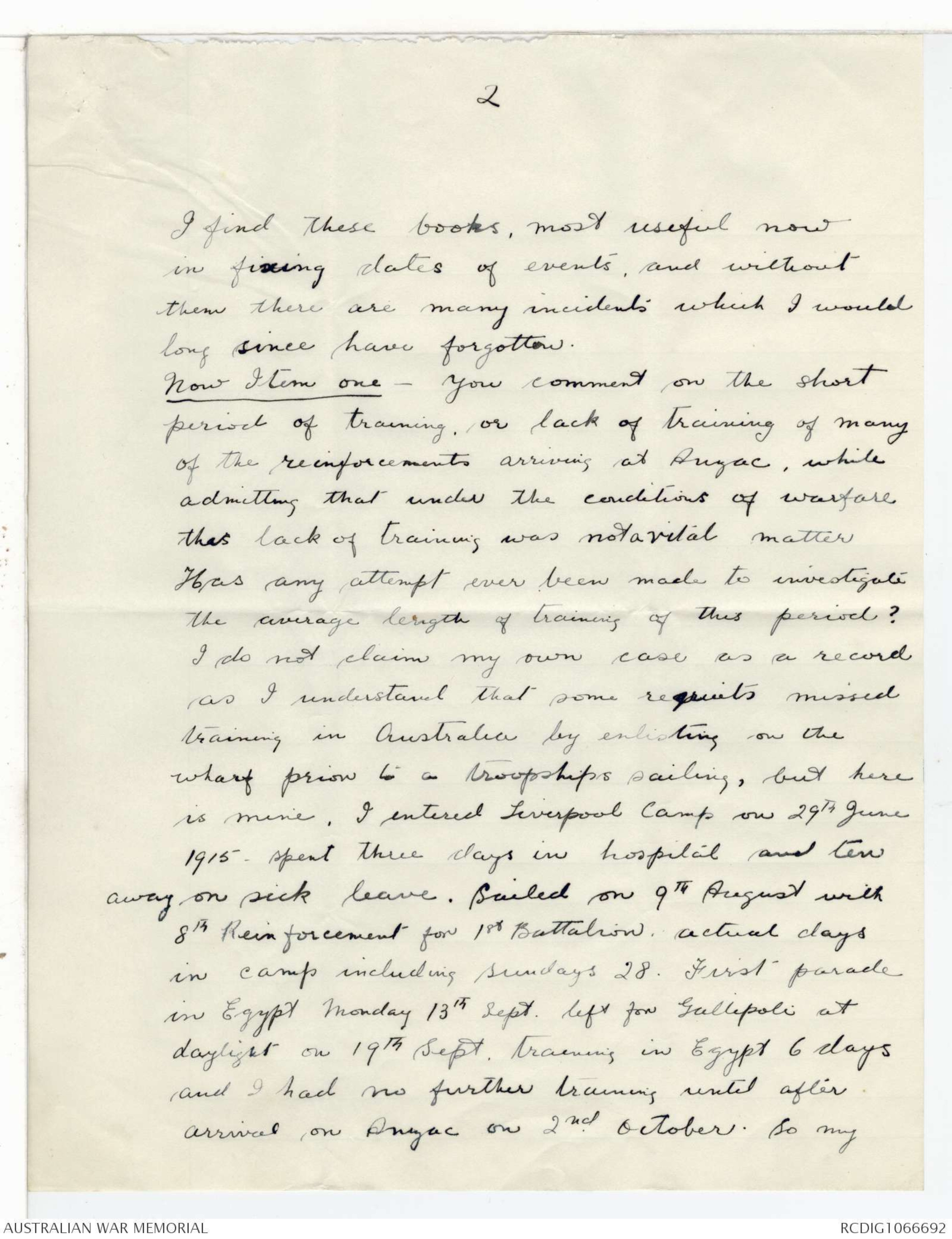
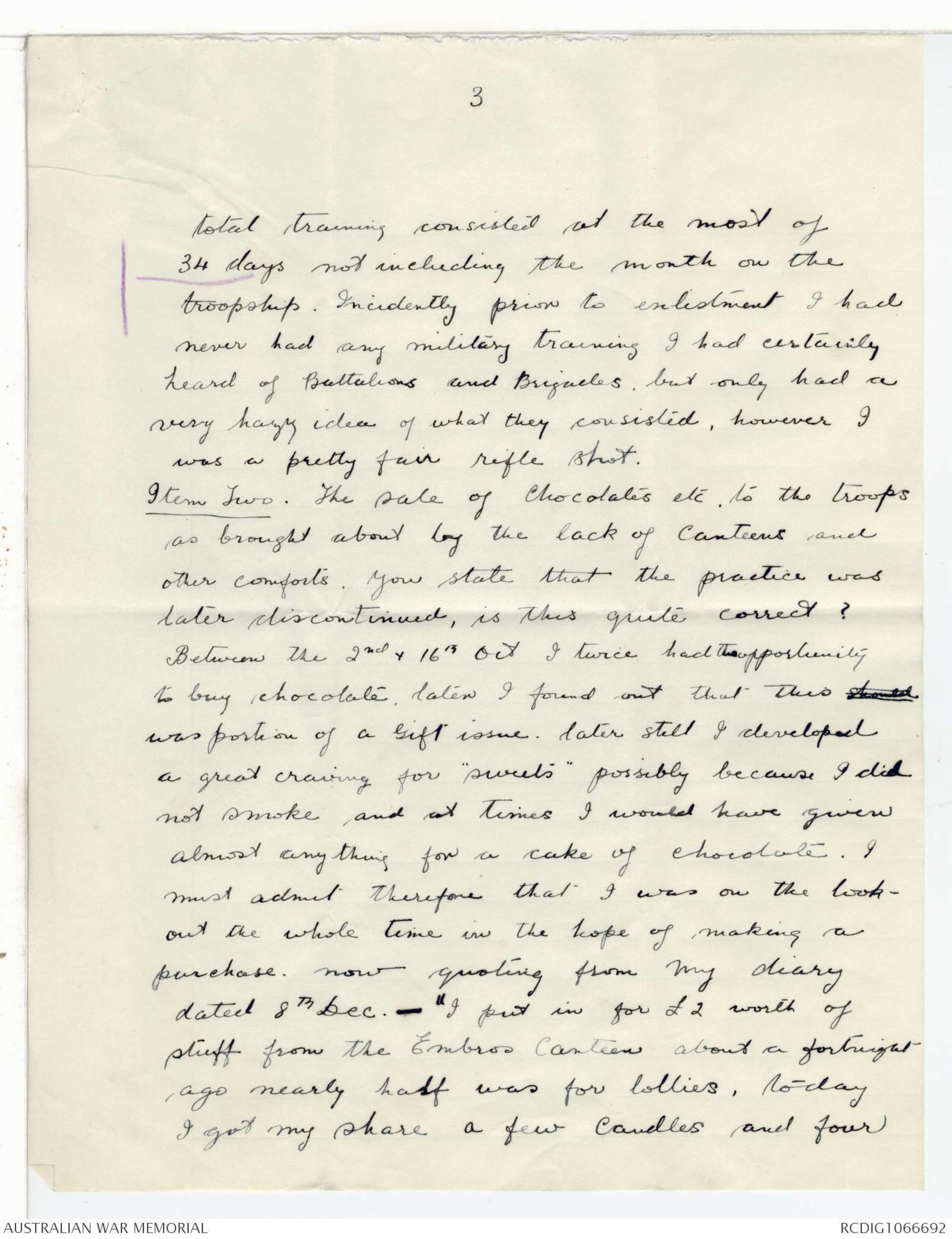
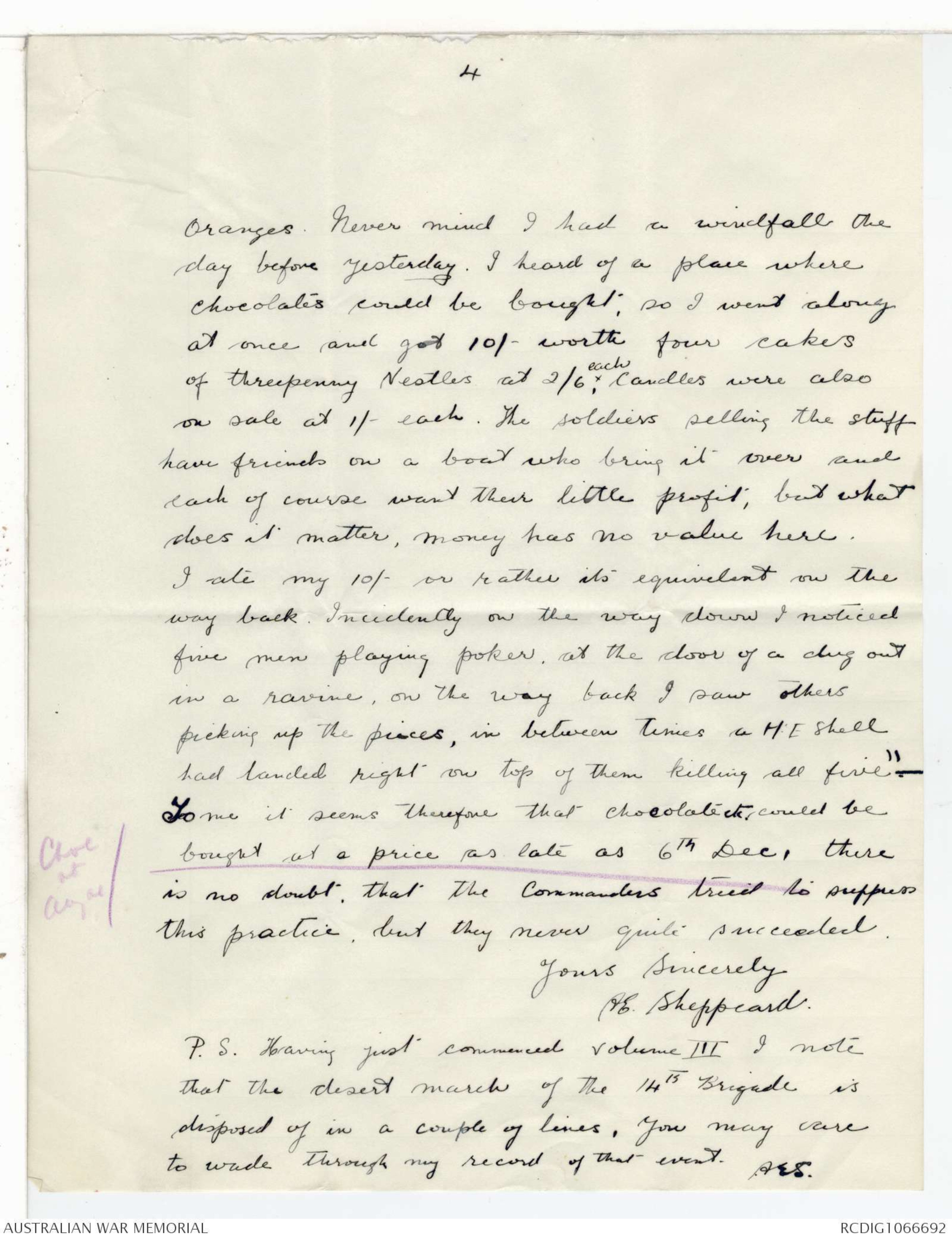
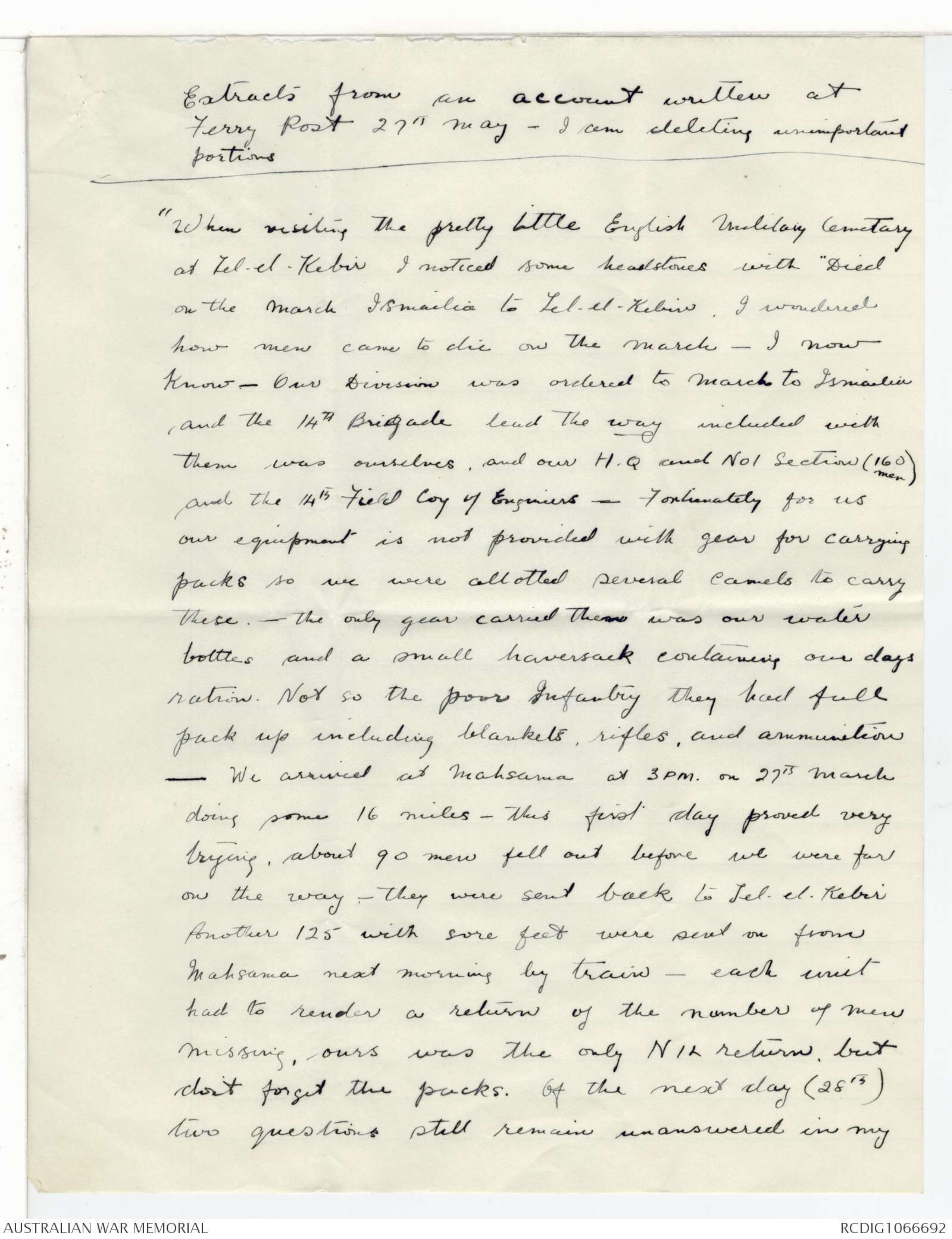
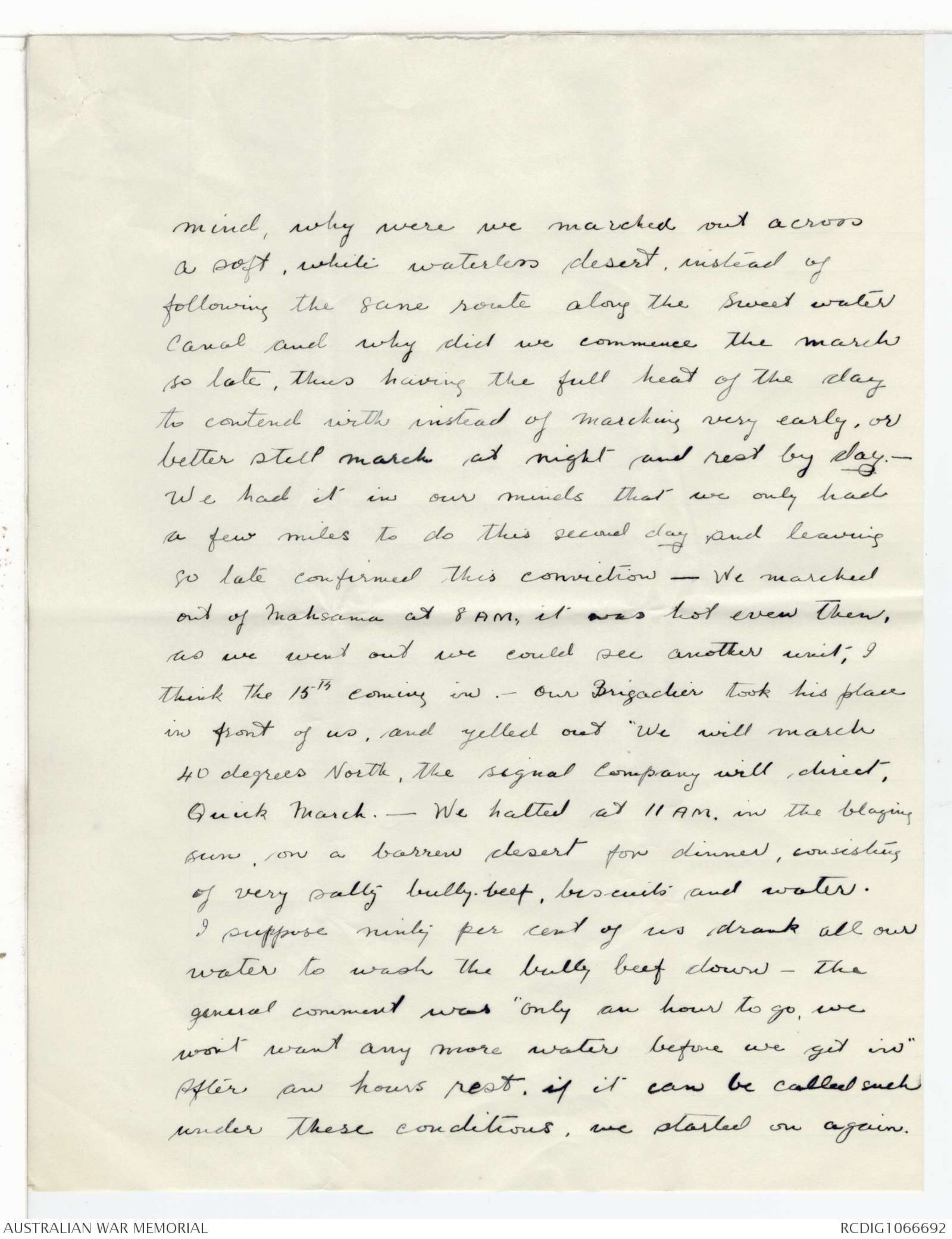
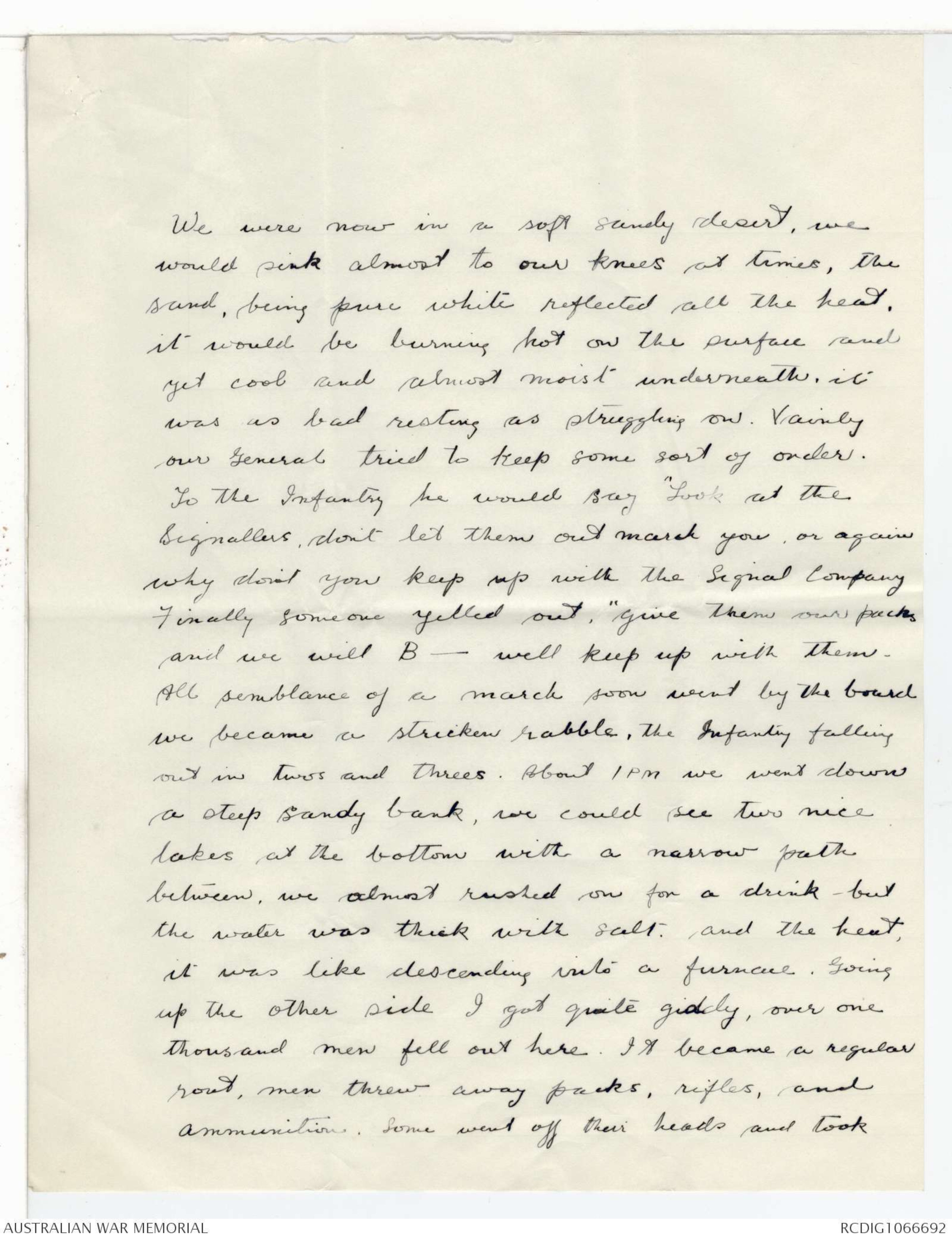
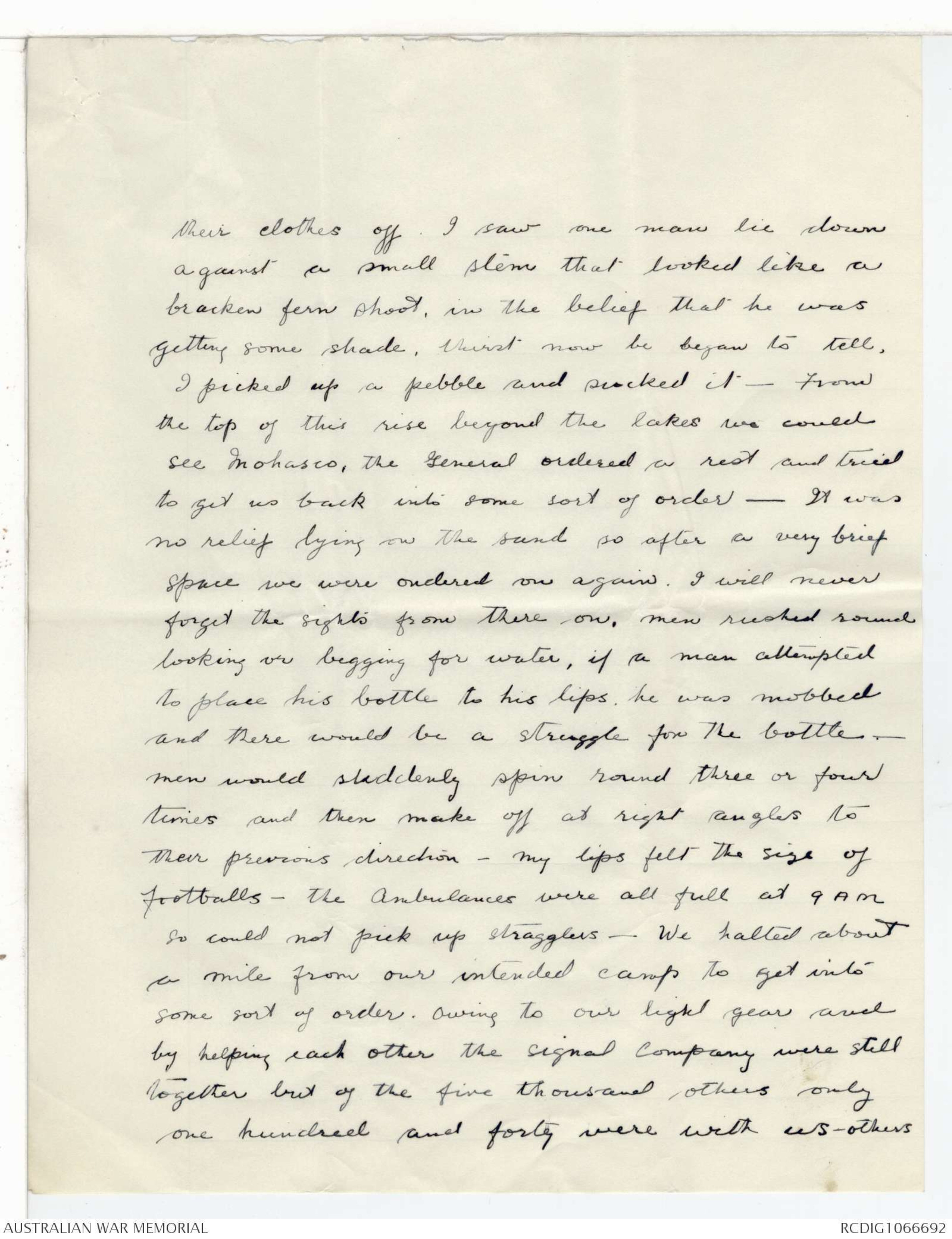
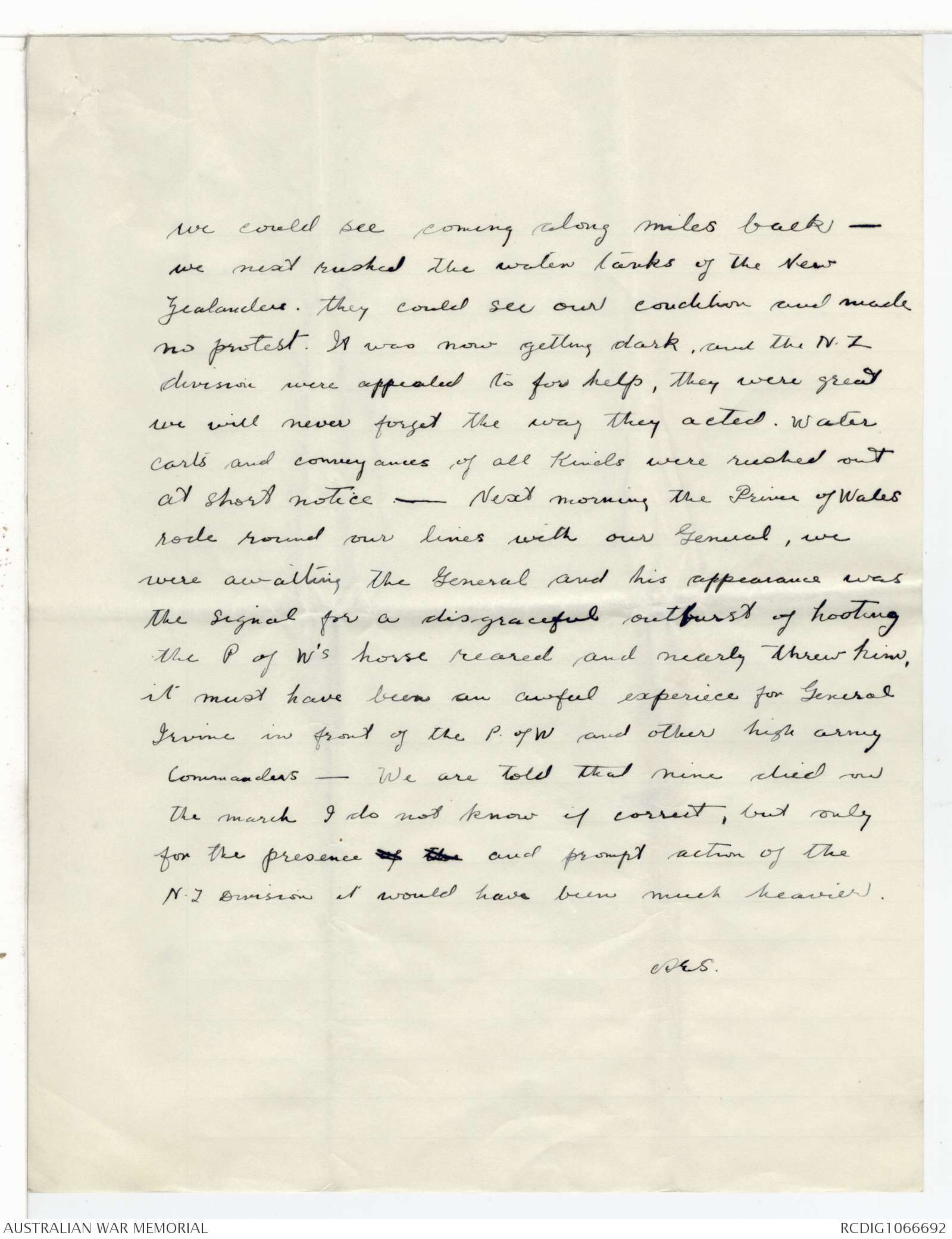
2
I find these books, most useful now
in fixing dates of events, and without
them there are many incidents which I would
long since have forgotten.
Now Item one - You comment on the short
period of training, or lack of training of many
of the reinforcements arriving at Anzac, while
admitting that under the conditions of warfare
this lack of training was not a vital matter
Has any attempt ever been made to investigate
the average length of training of this period?
I do not claim my own case as a record
as I understand that some recruits missed
training in Australia by enlisting on the
wharf prior to a troopships sailing, but here
is mine. I entered Liverpool Camp on 29th June
1915. spent three days in hospital and ten
away on sick leave. Sailed on 9th August with
8th Reinforcement for 1st Battalion. actual days
in camp including Sundays 28. First parade
in Egypt Monday 13th Sept. left for Gallipoli at
daylight on 19th Sept. training in Egypt 6 days
and I had no further training until after
arrival on Anzac on 2nd October. So my
3
total training consisted at the most of
34 days not including the month on the
troopships. Incidently prior to enlistment I had
never had any military training I had certainly
heard of Battalions and Brigades, but only had a
very hazy idea of what they consisted, however I
was a pretty fair rifle shot.
Item Two. The sale of Chocolates etc. to the troops
as brought about by the lack of Canteens and
other comforts. You state that the practice was
later discontinued, is this quite correct?
Between the 2nd & 16th Oct I twice had the opportunity
to buy chocolate. later I found out that this should
was portion of a Gift issue. later still I developed
a great craving for "sweets" possibly because I did
not smoke and at times I would have given
almost anything for a cake of chocolate. I
must admit therefore that I was on the lookout
the whole time in the hope of making a
purchase. now quoting from my diary
dated 8th Dec. - "I put in for £2 worth of
stuff from the Embros Canteen about a fortnight
ago nearly half was for lollies, today
I got my share a few candles and four
4
oranges. Never mind I had a windfall the
day before yesterday. I heard of a place where
chocolates could be bought, so I went along
at once and got 10/- worth four cakes
of threepenny Nestles at 2/6 xeach, candles were also
on sale at 1/- each. The soldiers selling the stuff
have friends on a boat who bring it over and
each of course want their little profit, but what
does it matter, money has no value here.
I ate my 10/- or rather its equivalent on the
way back. Incidently on the way down I noticed
five men playing poker. at the door of a dug out
in a ravine, on the way back I saw others
picking up the pieces, in between times a H.E shell
had landed right on top of them killing all five" -
To me it seems therefore that chocolate etc. could be
bought at a price as late as 6th Dec, there
[* Choc at Anzac *]
is no doubt, that the Commanders tried to suppress
this practice, but they never quite succeeded.
Yours Sincerely
AE. Sheppeard.
P.S. Having just commenced volume III I note
that the desert march of the 14th Brigade is
disposed of in a couple of lines, You may care
to wade through my record of that event
AES.
Extracts from an account written at
Ferry Post 27th May - I am deleting unimportant
portions
_________________________________________________
"When visiting the pretty little English Military Cemetary
at Tel-el-Kebir I noticed some headstones with "Died
on the march Ismailia to Tel-el-Kebir. I wondered
how men came to die on the march - I now
know - Our Division was ordered to march to Ismailia
and the 14th Brigade lead the way included with
them was ourselves, and our H.Q and No 1 Section (160 men)
and the 14th Field Coy of Engineers - Fortunately for us
our equipment is not provided with gear for carrying
packs so we were allotted several camels to carry
these. - the only gear carried then was our water
bottles and a small haversack containing our days
ration. Not so the poor Infantry they had full
pack up including blankets, rifles, and ammunition
- We arrived at Mahsama at 3 PM. on 27th March
doing some 16 miles - this first day proved very
trying, about 90 men fell out before we were far
on the way - they were sent back to Tel-el-Kebir
Another 125 with sore feet were sent on from
Mahsama next morning by train - each unit
had to render a return of the number of men
missing, ours was the only NIL return, but
don't forget the packs. Of the next day (28th)
two questions still remain unanswered in my
mind, why were we marched out across
a soft, white waterless desert, instead of
following the same route along the Sweet water
canal and why did we commence the march
so late, thus having the full heat of the day
to contend with instead of marching very early, or
better still march at night and rest by day. -
We had it in our minds that we only had
a few miles to do this second day and leaving
so late confirmed this conviction - We marched
out of Mahsama at 8 AM, it was hot even then,
as we went out we could see another unit, I
think the 15th coming in - our Brigadier took his place
in front of us, and yelled out "We will march
40 degrees North, the signal Company will direct,
Quick March. - We halted at 11 AM. in the blazing
sun, on a barren desert for dinner, consisting
of very salty bully-beef, biscuits and water.
I suppose ninty per cent of us drank all our
water to wash the bully beef down - the
general comment was "only an hour to go, we
wont want any more water before we get in"
After an hours rest, if it can be called such
under these conditions, we started on again.
We were now in a soft sandy desert, we
would sink almost to our knees at times, the
sand, being pure white reflected all the heat,
it would be burning hot on the surface and
yet cool and almost moist underneath, it
was as bad resting as struggling on. Vainly
our General tried to keep some sort of order.
To the Infantry he would say "Look at the
Signallers, dont let them out march you, or again
why don't you keep up with the Signal Company
Finally someone yelled out, "Give them our packs
and we will B - well keep up with them.
All semblance of a march soon went by the board
we became a stricken rabble, the Infantry falling
out in twos and threes. About 1 PM we went down
a steep sandy bank, we could see two nice
lakes at the bottom with a narrow path
between, we almost rushed on for a drink - but
the water was thick with salt. and the heat,
it was like descending into a furnace. Going
up the other side I got quite giddy, over one
thousand men fell out here. It became a regular
rout, men threw away packs, rifles, and
ammunition. Some went off their heads and took
their clothes off. I saw one man lie down
against a small stem that looked like a
bracken fern shoot, in the belief that he was
getting some shade, thirst now be began to tell.
I picked up a pebble and sucked it - From
the top of this rise beyond the lakes we could
see Mohasco, the General ordered a rest and tried
to get us back into some sort of order - It was
no relief lying on the sand so after a very brief
space we were ordered on again. I will never
forget the sights from there on, men rushed round
looking or begging for water, if a man attempted
to place his bottle to his lips, he was mobbed
and there would be a struggle for the bottle -
men would suddenly spin round three or four
times and then make off at right angles to
their previous direction - my lips felt the size of
footballs - the Ambulances were all full at 9 AM
so could not pick up stragglers - We halted about
a mile from our intended camp to get into
some sort of order. Owing to our light gear and
by helping each other the signal Company were still
together but of the five thousand others only
one hundred and forty were with us - others
we could see coming along miles back -
we next rushed the water tanks of the New
Zealanders. they could see our condition and made
no protest. It was now getting dark, and the N.Z
division were appealed to for help, they were great
we will never forget the way they acted. Water
carts and conveyances of all kinds were rushed out
at short notice - Next morning the Prince of Wales
rode round our lines with our General, we
were awaiting the General and his appearance was
the signal for a disgraceful outburst of hooting
the P of W's horse reared and nearly threw him.
it must have been an awful experience for General
Irvine in front of the P. of W and other high army
Commanders - We are told that nine died on
the march I do not know if correct, but only
for the presence of the and prompt action of the
N.Z Division it would have been much heavier.
AES.
 Sam scott
Sam scottThis transcription item is now locked to you for editing. To release the lock either Save your changes or Cancel.
This lock will be automatically released after 60 minutes of inactivity.